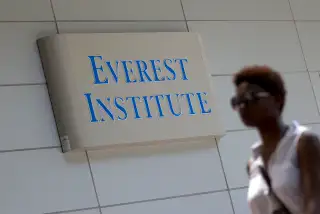How the Government Lets For-Profit Colleges Rip Off Students and Taxpayers

Why did the federal bureaucrat tell the for-profit college it should try to sell more shampoo? The question sounds like the opening line of a joke, but there’s no punchline here. Instead, the answer is part of the story of how predatory for-profit colleges continue to be rewarded with billions of dollars of federal taxpayer money despite repeated evidence that they provide a low-quality education at inflated prices.
We discovered the strange shampoo advice while reading government documents for a new report that examines the audits and inquiries that the federal government uses to monitor colleges’ use of federal financial aid dollars.
In this particular case, a school in Colorado was perilously close to violating a requirement that prohibits a school from getting 90% of its money from federal aid. When faced with this problem, the Department of Education’s official response was to suggest that the school sell more shampoo and other paraphernalia as part of its cosmetology training program to boost the percentage of revenue not coming from federal aid.
What makes these types of suggestions particularly troubling is that they emerged during an oversight process that should be a crucial federal tool to protect students and consumers. Yet after reviewing 167 independent audits of nonprofit and for-profit colleges and 148 inquiries by the staff of the U.S. Department of Education, we found the examinations are not designed to capture evidence about the types of frauds being perpetrated by for-profit colleges.
Missing the big picture
Rather than examining the honesty and fairness of a college’s marketing or student loan practices, the thousands of audits and inquiries conducted each year are, instead, almost completely focused on bookkeeping issues.
When done well, independent audits should keep a company honest by conducting tests to determine whether the data in its official documents is actually corroborated by clients and other outside parties. The audits conducted of for-profit colleges, however, are scripted to focus on items like whether federal student aid refunds were calculated correctly, disbursements were made in a proper timeframe, and students were in fact eligible for the aid they received.
These inquiries all identify only one set of issues—violating the complex rules that govern the awarding and return of federal aid. Nothing in the audits, however, addresses bigger-picture questions about whether students are adequately counseled about the school or their student loans and recruited ethically. The additional inquiries conducted by the department’s staff tend to have the same challenges.
By not structuring these oversight tools in the most effective manner, the Department of Education, and the independent inspector general within it, will continue to struggle to identify and head off fraudulent behavior early on. Instead, the department will keep relying on work done by state law enforcement agencies and private attorneys representing the former students who were hurt to drive oversight investigations—processes that can take years to finish and only after substantial harm is already done.
To prevent the next wave of fraud from occurring, the entire system of audits and inquiries needs to be overhauled. The guide that governs audits of for-profit colleges needs to be updated so that colleges’ marketing operations, among other issues, are subjected to at least the same level of scrutiny as are their financial records.
Auditors should certify that there are no problems with bigger picture issues and provide enough documentation to judge the quality of their work. And all these documents must become public in the name of transparency.
Asking the right questions
The culture and mindset around oversight at the Department of Education also has to change. Staff need to move away from technical compliance and focus on the underlying aims of protecting consumers and taxpayers. This means placing a greater emphasis on an institution’s performance with student loans, monitoring advertising and recruiting materials and processes to make sure they are truthful, and devoting more time and resources to reviews.
This is not an impossible task. When the Department of Education flexes its muscle, it can take swift action to help students, as can be seen in the closure of Corinthian Colleges, a bad actor on a national scale. The announcement of a new enforcement unit to conduct similar work is a much-needed step. And changes in consumer protection regulations have altered some of the incentives that lead colleges into bad behavior in the first place.
But all of these steps will struggle to be effective if the first line of oversight work is not properly calibrated to ask the right questions and look for the right problems. To ensure that happens requires a revamp of the monitoring of the colleges, and a shift in the mentality of the auditors and staff who are on the front lines.
Elizabeth Baylor is the director of postsecondary education at the Center for American Progress. Robert Shireman is a senior fellow at The Century Foundation.